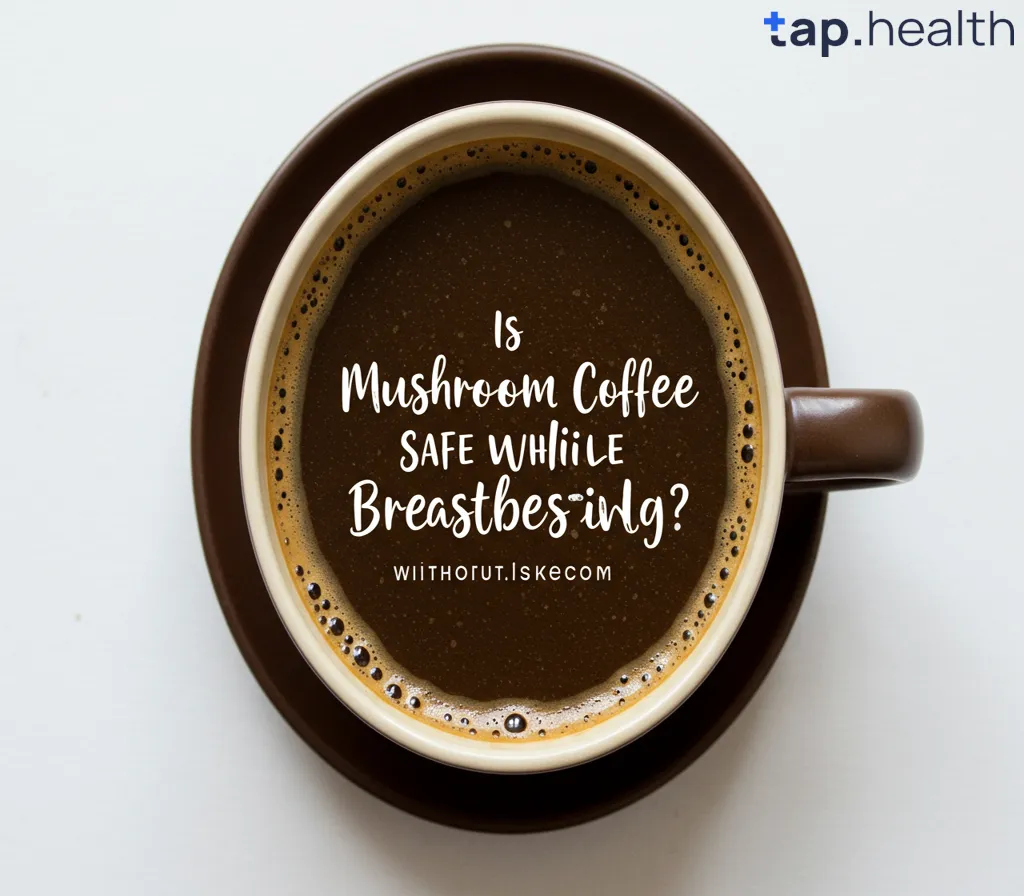If you’re a mom, you’re probably tired. Really tired. Between late-night feedings, diaper changes, and trying to eat something that isn’t cold by the time you take a bite, it’s no wonder you’re looking for an energy boost. That’s where mushroom coffee comes in—a trendy drink that promises alertness without the jitters, better focus, and even immune support.
But here’s the real question: Is mushroom coffee safe while breastfeeding?
You want to feel good and stay sharp, but not at the cost of your baby’s health. So let’s talk honestly—no fluff, no confusing science jargon. Just clear, reliable facts so you can make a smart decision.
In this detailed guide, we’ll cover:
- What mushroom coffee actually is (and what’s really in it)
- How much caffeine it contains and how that affects your baby
- Whether medicinal mushrooms like reishi, lion’s mane, and chaga are safe during breastfeeding
- What doctors and health experts say
- Signs your baby might be reacting
- Safer alternatives for energy
- And a step-by-step checklist to help you decide
We’ve researched top medical sources like the American Academy of Pediatrics (AAP), National Institutes of Health (NIH), LactMed database, and La Leche League to bring you accurate, trustworthy information.
Let’s get into it.
What Exactly Is Mushroom Coffee?
First things first: mushroom coffee isn’t made from the mushrooms you find in your grocery store. It doesn’t taste like sautéed portobellos or have chunks of fungus floating in your cup.
Instead, mushroom coffee is a blend of regular coffee (usually instant or ground) and powdered extracts from certain types of medicinal mushrooms—often called “functional” or “adaptogenic” mushrooms.
These mushrooms—like lion’s mane, reishi, chaga, and cordyceps—have been used in traditional medicine for centuries, especially in China, Japan, and Russia. They’re believed to support brain health, reduce stress, and boost immunity.
So when you drink mushroom coffee, you’re getting:
- The energy boost from caffeine
- The claimed benefits of mushroom extracts (like mental clarity or immune support)
- A smoother, earthier taste than regular coffee
But here’s the catch: just because it sounds natural doesn’t mean it’s safe during breastfeeding.
How Is Mushroom Coffee Different From Regular Coffee?
Let’s break it down simply.
| Main ingredient | Roasted coffee beans | Coffee + mushroom extract |
| Caffeine level | High (about 95 mg per 8 oz) | Varies—often 25–75 mg per cup |
| Taste | Bitter, bold | Earthy, nutty, sometimes milder |
| Added ingredients | Usually none | Often includes mushroom powders, sometimes herbs or sweeteners |
Some brands replace half the coffee with mushroom powder, so the caffeine is lower. Others keep full-strength coffee and just add mushroom extract on top.
That means not all mushroom coffees are created equal. One brand might be low-caffeine and simple. Another might have as much caffeine as a latte—and extra herbs you didn’t ask for.
Always read the label.
Is Mushroom Coffee Safe While Breastfeeding?
There’s no strong research proving mushroom coffee is safe during breastfeeding, so the cautious choice is to limit or avoid it, especially blends with reishi or chaga, and focus on total daily caffeine under 200–300 mg while watching the baby for fussiness or poor sleep. Consult a clinician before use.
Is Caffeine in Mushroom Coffee Safe for Breastfeeding Moms?
Yes—but only in small amounts.
Here’s what you need to know.
Does Caffeine Pass Into Breast Milk?
Yes. When you drink anything with caffeine—coffee, tea, soda, chocolate—some of it does pass into your breast milk. It doesn’t go in all at once. It takes about 30 minutes to 1 hour for caffeine to show up in your milk. The levels peak around 1 hour after you drink it, then slowly go down.
Only about 1% of the caffeine you consume actually ends up in your milk. But babies process caffeine much more slowly than adults.
- Adults clear caffeine in 3–7 hours
- Newborns can take up to 100 hours to clear the same amount
That means even small doses can build up in your baby’s system if you drink caffeine every day.
How Much Caffeine Is in Mushroom Coffee?
It depends on the brand. Some mushroom coffees have as little as 25 mg of caffeine per serving. Others have up to 90 mg—almost as much as a regular cup.
For comparison:
- Regular brewed coffee: ~95 mg per 8 oz
- Decaf coffee: 2–5 mg
- Green tea: 25–45 mg
- Dark chocolate (1 oz): ~12 mg
- Most mushroom coffee: 25–75 mg
So, many mushroom coffee brands are lower in caffeine, which can be a good thing for breastfeeding moms.
But don’t assume it’s automatically safe. Always check the label.
How Much Caffeine Is Safe While Breastfeeding?
The general rule from the American Academy of Pediatrics (AAP) and La Leche League is:
Up to 300 mg of caffeine per day is usually safe for most breastfeeding moms.
That’s about:
- 3–4 cups of mushroom coffee (if it’s low-caffeine)
- 2–3 cups of regular coffee
- Or a mix of coffee, tea, and chocolate
But here’s the truth: every baby is different.
Some babies are super sensitive. Even 50 mg of caffeine can make them:
- Fussy or jittery
- Wide awake when they should be sleeping
- Hard to nurse because they’re too restless
If your baby is premature, newborn, or under 3 months old, they’re especially sensitive. Their liver and brain aren’t fully developed yet, so they can’t process caffeine well.
When Should You Drink Mushroom Coffee to Protect Your Baby?
Timing matters. To reduce how much caffeine your baby gets:
- Drink your mushroom coffee right after a feeding
- Wait at least 1–2 hours before nursing again
- Avoid drinking it in the afternoon or evening, so it doesn’t mess with your baby’s sleep
For example:
If your baby nurses at 9:00 AM, drink your coffee at 9:15 AM. By the time they feed again at 11:00 AM, most of the caffeine peak will have passed.
This simple trick can help protect your baby’s sleep and mood.
Are Medicinal Mushrooms Safe During Breastfeeding?
Now we get to the big concern: the mushrooms themselves.
We know a little about caffeine. But what about lion’s mane, reishi, chaga, or cordyceps? Are they safe when you’re breastfeeding?
The short answer: We don’t know.
There is very little research on whether these mushroom extracts are safe during pregnancy or breastfeeding. Most studies are done on animals, in labs, or on healthy adults—not nursing moms.
That doesn’t mean they’re dangerous. But it also doesn’t mean they’re safe.
Let’s look at each one.
Lion’s Mane Mushroom
Claimed benefits:
- Improves focus and memory
- Supports brain health
- May help with nerve repair
Is it safe while breastfeeding?
There’s no research on lion’s mane and breastfeeding. It’s been used safely in adults, and no major side effects are reported.
But—lion’s mane can cause allergic reactions in some people. Symptoms include rash, itching, or trouble breathing.
We don’t know if it passes into breast milk or how it might affect your baby’s developing brain.
So, while it’s probably low-risk, there’s no proof it’s safe. Better to avoid it unless approved by your doctor.
Reishi Mushroom
Claimed benefits:
- Calms the nervous system
- Helps with sleep and stress
- Supports immunity
Is it safe while breastfeeding?
No. Most experts say avoid reishi while breastfeeding.
Here’s why:
- Reishi can act like a mild sedative. Could that make your baby drowsy or affect feeding?
- It may affect liver function. There are rare reports of liver damage in adults taking reishi long-term.
- It can lower blood pressure and thin the blood, which is risky if you had a C-section or are on certain medications.
- The National Institutes of Health (NIH) warns that reishi is not recommended during pregnancy or breastfeeding due to lack of safety data.
Bottom line: Avoid reishi while nursing. It’s one of the riskiest mushrooms in these blends.
Chaga Mushroom
Claimed benefits:
- High in antioxidants
- Fights inflammation
- May support immune health
Is it safe while breastfeeding?
Again—no research on chaga and breastfeeding.
But chaga contains high levels of oxalates, which in large amounts can lead to kidney stones. While the amount in mushroom coffee is small, long-term use could be a concern.
Also, chaga may stimulate the immune system. That’s great when you’re sick, but during breastfeeding, your immune system is already working hard. Overstimulation could cause issues.
Until we know more, it’s best to avoid chaga while nursing.
Cordyceps Mushroom
Claimed benefits:
- Boosts energy and stamina
- Improves oxygen use
- May support hormone balance
Is it safe while breastfeeding?
Cordyceps may affect hormone levels, including estrogen and testosterone.
Since breastfeeding depends on a delicate balance of hormones (especially prolactin and oxytocin), anything that messes with hormones could affect your milk supply.
No studies on nursing women. So, avoid cordyceps unless your doctor says it’s okay.
Could Mushroom Coffee Affect Your Milk Supply?
There’s no direct evidence that mushroom coffee increases or decreases milk supply.
But some ingredients could have indirect effects.
For example:
- High caffeine (over 300 mg/day) might slightly reduce milk production, though the evidence is weak.
- If your baby is fussy or sleeps poorly due to caffeine, they might nurse less often—which can lower your supply over time.
- Reishi and cordyceps may affect hormones involved in milk production. No proof, but possible.
So, while mushroom coffee isn’t known to hurt supply, it’s not proven to help either.
The best way to support milk supply is:
- Nurse or pump often
- Stay hydrated
- Eat balanced meals
- Get rest when you can
Not a magic mushroom blend.
What Do Doctors and Experts Say?
Most healthcare professionals take a “better safe than sorry” approach.
Here’s what trusted sources say:
American College of Obstetricians and Gynecologists (ACOG)
- Advises avoiding herbal supplements during pregnancy and breastfeeding unless proven safe.
- Says caffeine is okay in moderation (under 300 mg/day).
- Recommends talking to your doctor before taking any new supplement.
La Leche League International
- Suggests avoiding adaptogens (like medicinal mushrooms) while nursing due to lack of safety data.
- Encourages moms to focus on whole foods, hydration, and rest instead.
National Institutes of Health (NIH) – Office of Dietary Supplements
- States that many herbal products have not been studied in pregnant or breastfeeding women.
- Warns that “natural” does not mean safe.
- Specifically flags reishi as not recommended during pregnancy or breastfeeding.
LactMed (NIH’s Database on Drugs and Lactation)
- Says caffeine is compatible with breastfeeding in moderate amounts.
- Has no data on lion’s mane, reishi, chaga, or cordyceps.
- When in doubt, advises avoiding supplements unless clearly needed.
So, while no major group says mushroom coffee is dangerous, they all agree: there’s not enough evidence to say it’s safe.
Can Mushroom Coffee Make Your Baby Fussy or Jittery?
Yes. Especially if it contains caffeine.
Signs your baby might be reacting:
- Fussiness or irritability – Caffeine can make babies wired or uncomfortable.
- Trouble sleeping – Even if you sleep fine, your baby might wake often or resist naps.
- Jitteriness or tremors – Rare, but possible with high caffeine levels.
- Poor feeding – If baby is too fussy, they might nurse less.
- Gas or constipation – Could be from mom’s diet, but worth watching.
If you notice any of these after drinking mushroom coffee, stop and see if things improve.
Also, watch for allergic reactions. Though rare, some people are allergic to mushrooms. If you or your baby develop a rash, swelling, or breathing issues, get medical help right away.
What Other Ingredients Should You Watch For?
Not all mushroom coffee is just coffee and mushrooms. Some brands add extra stuff that could be risky.
Always read the label.
1. Added Sugars or Artificial Sweeteners
- Some blends contain sugar, syrups, or artificial sweeteners like sucralose.
- High sugar isn’t great for your energy levels or baby’s health.
- Artificial sweeteners like aspartame are not recommended during breastfeeding.
Better choice: Look for unsweetened or naturally sweetened options (like stevia, in small amounts).
2. Fillers or Additives
- Common fillers: maltodextrin, silicon dioxide, natural flavors.
- These aren’t well studied in nursing moms.
- Can cause bloating or digestive upset.
Better choice: Choose brands with clean labels—just coffee and mushroom extract.
3. Other Adaptogens or Herbs
- Some blends also contain ashwagandha, ginseng, rhodiola, or turmeric.
- These are powerful herbs that affect hormones, stress, and immunity.
- Ashwagandha may lower thyroid hormones—risky if you have postpartum thyroid issues.
- Ginseng can increase blood pressure and interact with medications.
Better choice: Avoid blends with extra herbs unless approved by your doctor.
Can Mushroom Coffee Help With Postpartum Fatigue?
Many moms drink it hoping for more energy. And let’s be real—newborns are exhausting.
But can mushroom coffee really help?
Maybe a little—but not as much as you think.
- The low caffeine can give a mild boost.
- Lion’s mane may support mental clarity.
- Reishi might help you relax.
But here’s the truth: no coffee can replace real rest, good food, and support.
Better ways to fight exhaustion:
- Nap when the baby naps (even 20 minutes helps)
- Drink plenty of water
- Eat protein-rich snacks (eggs, nuts, yogurt)
- Ask for help (from partner, family, friends)
- Talk to your doctor if you feel constantly drained—it could be anemia or postpartum depression
Mushroom coffee might give you a small lift, but it’s not a fix for deep fatigue.
Are There Safer Alternatives to Mushroom Coffee?
Yes! If you want energy and focus without the unknowns, try these:
1. Regular Coffee (in Moderation)
- Stick to 1–2 cups per day
- Choose light or medium roast (less acidic)
- Avoid afternoon/evening cups
2. Decaf Coffee or Herbal Tea
- Still gives you the ritual without the caffeine
- Safe herbal teas: chamomile, rooibos, ginger, peppermint
3. Golden Milk (Turmeric Latte)
- Made with turmeric, cinnamon, and warm milk
- Anti-inflammatory and soothing
- Zero caffeine
4. Water with Lemon and a Pinch of Salt
- Dehydration causes fatigue
- This simple drink boosts hydration and electrolytes
5. Matcha (in Small Amounts)
- Has caffeine + L-theanine (calms the mind)
- Limit to 1 cup per day
6. Just Rest and Eat Well
- Oats, eggs, nuts, and leafy greens support energy and milk supply
- Hard to do, but most effective
You don’t need a fancy blend to feel better. Sometimes, the simplest things work best.
What Should You Do Before Trying Mushroom Coffee?
If you’re still curious, here’s a safe, step-by-step plan:
Step 1: Talk to Your Doctor or Midwife
- Bring the product label
- Ask if the ingredients are safe for you and your baby
- Mention any health conditions (like thyroid issues, anxiety, or high blood pressure)
Step 2: Start with a Tiny Amount
- Try half a cup (or less) in the morning
- Wait 2–3 hours, then nurse
- Watch your baby for 24 hours
Step 3: Monitor Your Baby Closely
- Look for fussiness, sleep changes, or feeding issues
- Keep a simple log: what you drank, when, and how baby acted
Step 4: Stop If You See Any Problems
- Don’t wait to see if it gets better
- Eliminate one variable at a time to find the cause
Step 5: Choose a Trusted Brand
- Look for third-party tested products (like NSF or USP certified)
- Avoid blends with added herbs, sugars, or fillers
- Stick to single mushroom types (like lion’s mane only) at first
Remember: your baby’s health comes first. If you’re unsure, it’s okay to wait until you’re done breastfeeding.
Is Organic Mushroom Coffee Safer?
“Organic” means no synthetic pesticides or fertilizers. That’s good.
But organic doesn’t mean safe during breastfeeding.
An organic mushroom extract is still a supplement with unknown effects. The same rules apply: no research = unknown risk.
That said, choosing organic can reduce your exposure to toxins, which is always a good thing—especially when you’re feeding a baby.
So, if you decide to try it, go organic if you can. But don’t assume it’s automatically safe.
How Long Does It Take for Mushroom Coffee to Leave Your System?
- Caffeine takes about 3–7 hours to clear from your body (but up to 100+ hours in newborns).
- Mushroom compounds—we don’t know. They’re broken down by the liver, but how long they stay in your system (or breast milk) isn’t studied.
To be safe:
- Drink it in the morning
- Wait at least 2 hours before nursing
- Limit to once per day
And remember: compounds can build up if you drink it every day.
Final Verdict: Is Mushroom Coffee Safe While Breastfeeding?
Here’s the honest answer:
✅ The caffeine in mushroom coffee is likely safe in small amounts—especially since most blends have less caffeine than regular coffee.
❌ The mushroom extracts are not proven safe during breastfeeding. There’s no research showing they harm you or your baby, but there’s also no proof they’re safe.
⚠️ Until we have better data, most experts recommend avoiding medicinal mushroom supplements while nursing.
So, is it dangerous? Probably not in tiny amounts.
Is it recommended? No.
Best advice:
If you really want to try it, talk to your doctor first, start with a small amount, and watch your baby closely. But if you’re unsure, skip it. There are safer ways to stay alert and healthy while breastfeeding.
Frequently Asked Questions (FAQ) on Is Mushroom Coffee Safe During Pregnancy?
How much caffeine is okay during breastfeeding?
Most health groups say 200–300 mg per day is safe for most moms. That’s about 1–3 cups of mushroom coffee, depending on the brand. Watch your baby for signs of sensitivity like fussiness or poor sleep.
Does caffeine from mushroom coffee pass into breast milk?
Yes. Caffeine peaks in your milk about 1 hour after you drink it. Only about 1% of what you consume gets into your milk, but babies clear it slowly—sometimes taking over 3 days.
Which mushrooms in coffee are most concerning?
Reishi is the biggest concern—it’s linked to liver issues and not recommended during breastfeeding. Chaga and cordyceps also lack safety data. Lion’s mane is likely safer but can cause allergies.
Can mushroom coffee hurt milk supply?
There’s no direct evidence. But if your baby is fussy or sleeps poorly due to caffeine, they might nurse less—leading to lower supply over time. Also, some mushrooms may affect hormones involved in milk production.
What if my baby gets fussy after I drink mushroom coffee?
Stop drinking it. Wait a few days and see if your baby improves. If the fussiness returns when you restart, the coffee is likely the cause.
Are decaf or half-caf mushroom coffees safer?
They have less caffeine, which is good. But they still contain mushroom extracts with unknown safety. Always check the label and avoid blends with reishi, chaga, or added herbs.
Are there safer alternatives to boost energy?
Yes. Try:
- 1 cup of regular coffee in the morning
- Herbal teas like chamomile or rooibos
- Drinking more water
- Eating protein-rich snacks
- Taking short naps
- Getting sunlight and light exercise
These are safer and more effective than unproven supplements.
Should I avoid reishi while breastfeeding?
Yes. Reishi is not recommended during breastfeeding due to potential liver effects, blood-thinning properties, and lack of safety data. Many experts advise avoiding it completely.
What’s the best time to drink coffee while breastfeeding?
Right after a feeding. That way, the caffeine peaks in your milk and starts to drop before the next nursing session. Avoid coffee after noon to protect your baby’s sleep.
Can mushroom coffee cause allergies in babies?
It’s rare, but possible. If you or your baby have a mushroom allergy, avoid it completely. Watch for rashes, swelling, or breathing issues.
Is instant mushroom coffee safe?
It depends on the brand. Some instant versions have more additives or fillers. Always read the label and choose simple, clean formulas.
Can mushroom coffee help with postpartum depression?
No. While some mushrooms are being studied for brain health, they are not a treatment for postpartum depression. If you’re feeling sad, anxious, or overwhelmed, talk to your doctor. Real help includes therapy and sometimes medication.
Should I “pump and dump” after drinking mushroom coffee?
No. You don’t need to pump and dump. Just time your coffee right after a feeding and limit your intake. The small amount of caffeine that passes into milk is usually not harmful in moderation.
Final Thoughts
Being a breastfeeding mom is one of the hardest jobs in the world. You’re doing your best, and it’s okay to want a little help staying awake and focused.
But when it comes to supplements like mushroom coffee, “natural” doesn’t mean safe. And when you’re nursing, even small risks matter.
Until we have solid research, the smartest choice is to avoid mushroom coffee—especially blends with reishi, chaga, or extra herbs.
Stick to simple, proven ways to feel better: drink water, eat well, rest when you can, and ask for help.
And if you ever feel unsure, talk to your doctor or a lactation consultant. They’re your best resource.
You’re doing an amazing job. And sometimes, the best thing you can do for your baby is to take care of yourself—safely.



